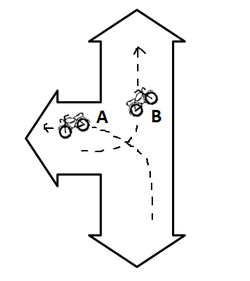 Tamale has a number of traffic norms that would make a driver's ed teacher turn to drink on the road. A classic example is the "Tamale turn", pictured at left. In Tamale, if you are making a left turn off of an arterial, and there is vehicle waiting to turn left ON to the arterial, rather than pass in front of the other vehicle, you pass behind them, while they simultaneously turn onto the arterial. One can see why drivers might think this makes sense. Both vehicles can turn at once, and if the arterial is busy, the vehicle waiting to turn on to it can take advantage of the other vehicle slowing down. But as traffic gets denser, the Tamale turn becomes more hazardous. If there are several vehicles waiting to turn on to the arterial, the vehicle turning off the arterial has to negotiate a route behind the turning vehicle, and in front of the waiting vehicles, who may not be on the lookout for a turning vehicle. And more vehicles in the intersection at once raises the risk of a collision as well. As Tamale's traffic worsens, many similar traffic norms, such as running red lights and passing on the right, technically illegal but general practice in Tamale, will become less efficient and more hazardous. But they will already be ingrained as the standard. What to do? Some ideas: 1. Give driver's licenses based on merit rather than bribes, to give drivers an incentive to learn the rules on the books. 2. Ticket drivers for practices that threaten public safety rather than focusing on trivial offenses easy to convert to payouts. Your additional ideas are welcome in the comments!
3 Comments
Clearly, the nations of the world are not going to line up to let me randomize their monetary policy. But what if I could convince one to do so?
Randomized control trials (RCTs), when ethical and possible, present the most reliable way to measure the impact of policy. Units of randomization, for instance people, are put into a treatment group, who gets a program or policy, and a control group, that doesn't get the program or policy. You compare outcomes for the two groups to see the impact of the program. The key to the validity of the RCT is that the sample size has to be big enough that when you randomly divide into treatment and control, there are no important systemic differences between the two groups. Randomization isn't used to evaluate macroeconomic policies for 2 reasons: 1) it is usually too important for people to allow it to be randomized, and 2) it has to be enacted at a high level-- national or maybe state or province-- so it is difficult to get a large enough sample. But what if we randomized, not by entities like people or countries, but across years? For example, what if the Federal Reserve allowed me to randomly change the policy interest rate by +25 basis points, 0 basis points, or -25 basis points? Over a long enough time frame, the periods that fall into each randomization group should be statistically the same on average. This would allow us to look at the effect of the interest rate change on the economy. Of course, there are some kinks to be worked out. Similar to spillover effects, policy changes have impacts across multiple periods; however, these could be measured and accounted for. Another problem is checking the balance of the randomization. There would be no equivalent to a baseline, and you couldn't stratify, since you don't know the attributes of future time periods in advance. These problems would imply that you need a very large sample size. There are certainly other methodological challenges I haven't thought of. I imagine I will have plenty of time to think through them before the first problem-- the fact that politicians, who insist they can control things they can't, would never randomize something they can-- is solved. But if anyone hears about a central bank looking for a monetary policy consultant, let me know. |
About Liz
I have worked in economic policy and research in Washington, D.C. and Ghana. My husband and I recently moved to Guyana, where I am working for the Ministry of Finance. I like riding motorcycle, outdoor sports, foreign currencies, capybaras, and having opinions. Archives
December 2016
Categories
All
|
 RSS Feed
RSS Feed
